I have a C# program that runs a macro existing inside an xlsm file and after this macro has finished its operations, I would like to save this xlsm as .xlsx file. This is the code that runs and saves the macro file as xlsx:
void RunMacro(string macroFilename, string xlsxFilePath)
{
Excel.Application app = new Excel.Application();
Excel.Workbook workbook;
workbook = app.Workbooks.Open(macroFilename);
app.Visible = true;
app.Run("Main");
workbook.SaveAs(xlsxFilePath, Excel.XlFileFormat.xlOpenXMLWorkbook);
app.Workbooks.Close();
app.Quit();
}
Now, the issue is that in the line workbook.SaveAs(), I will get a prompt like this from Excel:

So how can I make it programatically that "Yes" is the default option here and this prompt is automatically closed without needing to click on anything?
EDIT: The following threads (linked as the reason for closing this question) are not a solution:
How do I save an XLSM file as an XLSX file without prompting the user about lost data?
Save a *.xlsm file as *.xlsx and suppress the pop-up
Basically, there are two proposed solutions in these threads:
- Set
application.DisplayAlerts = falseand callworkbook.SaveAs(xlsxFilePath, Excel.XlFileFormat.xlOpenXMLWorkbook);This still results in a prompt coming up where it is necessary to select 'Yes'. Here is my code:
void RunMacro(string macroFilename, string xlsxFilePath)
{
Excel.Application app = new Excel.Application();
Excel.Workbook workbook;
workbook = app.Workbooks.Open(macroFilename);
app.Visible = true;
app.DisplayAlerts = false;
app.Run("Main");
workbook.SaveAs(xlsxFilePath,Excel.XlFileFormat.xlOpenXMLWorkbook);
app.Workbooks.Close();
app.Quit();
}
- Use
Workbook.SaveCopyAs(xlsxFilePath)
This method call does circumvent the Excel prompt, but the xlsx file that it produces is corrupted:

Here is the code:
void RunMacro(string macroFilename, string xlsxFilePath)
{
Excel.Application app = new Excel.Application();
Excel.Workbook workbook;
workbook = app.Workbooks.Open(macroFilename);
app.Visible = true;
app.Run("Main");
workbook.SaveCopyAs(xlsxFilePath);
app.Workbooks.Close();
app.Quit();
}